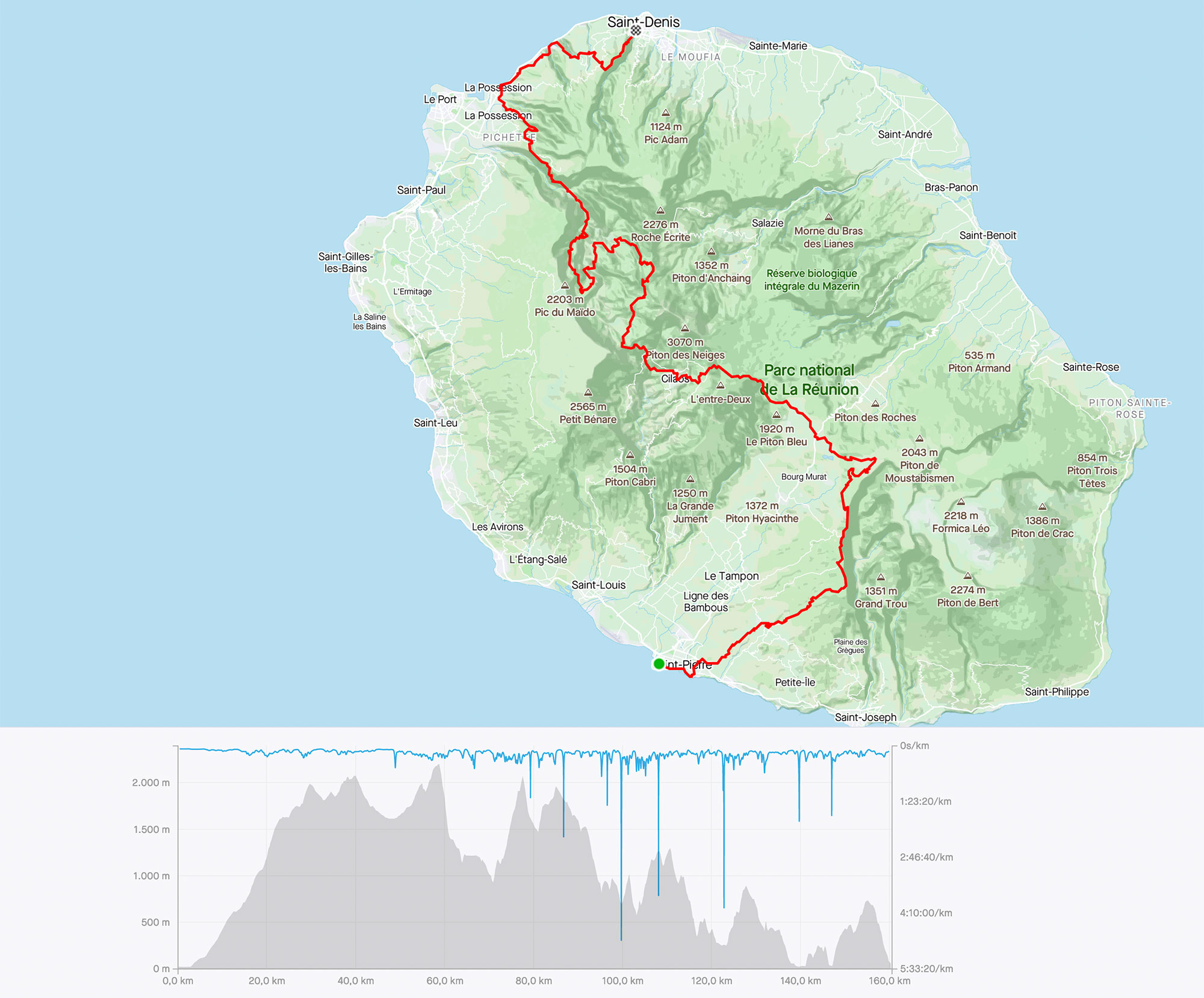The right attitude, when running Ultra Trail races, is what makes you carry on, on the edge of exhaustion, for hours on end, while exclusively focusing on the distance between you and your goal – everything else just fades away. You know you are wearing yourself out as you go along but you do everything you can to burn yourself out completely just 5 metres from the finish line.
Well, I think I have lost that attitude, or rather, I have lost the ability to give it my all, to take risks in order to go as fast as possible towards the goal. I am not afraid of fatigue and suffering, but of what I feel once I cross the finish line. I am not talking about physical pain. It is not, of course, the soreness in the muscles, which has its pleasant side, because it reminds you in a funny way of what you achieved with your legs. It is, rather, that strange feeling in which your body demands rest, nourishment and hydration but at the same time rejects them because it is too exhausted. This feeling is now ingrained in me after all these years, and sits in a part of my brain that I cannot control while running. Experience helps me to master all the alarm signals that the brain keeps sending me but that feeling has a communication channel that I can't block and it sounds like a siren during a bombardment, I can't help but feel it.
This year I tried to take up racing again, on a few occasions I even managed to recreate that wonderful feeling where everything runs smoothly, without a hitch: running to the best of my abilities without overexerting my body, but these races were rather short ones, between fifty and sixty kilometres. When I tried to run a race over 100k long, as soon as the alarm bells went off in my brain I was no longer able to continue, the signal was unmistakable for me at that time: what are you doing? Do you have any idea what you'll be reduced to if you go on like this? I didn't even try to react, my stomach protested and I gave up. It's a crap one, our sport, not only do you have to be physically prepared and that's not easy, but you also need to have bulletproof mental strength. The chasm between what I want to do and what I can do is getting wider and wider. Like all defeats, this one also brought a lesson with it: I had to reconsider my possibilities, my calculations and accept the dawning of a new era; I am no longer able to reach my limit. But how far I must stay below it remains to be discovered.
Premise over. I am now left with a free bib for one of the most coveted races for those who, like me, started doing Ultra Trail more than ten years ago. A race the insiders call 'La diagonale des Fous', or 'The Diagonal of the Mad Ones'.
Two years ago I was in Chamonix with the Wild Tee stand, when a gentleman who was comparing two of our T-shirts saw my bibs framed on the walls (I use them as a backdrop for our Endurance hats) and told me that one was missing. I replied that there were actually many missing; he was referring to the one from the Grand Raid of Reunion though, and, smiling, told me to write to him - he was the race director. Needless to say, as soon as he left, I sent him an e-mail. A few days later, keeping his word, the organizers sent me a code to register for the race.
After an exhausting while, someone in the family passes away; Irene needs a break and I suggest that we could go to La Reunion for a few days. We find a flat with Wi-Fi so that we can work remotely, quickly organise the trip and leave. Fortunately, Air France allows us to offset the flight's CO2 emissions with frequent flyer points and my conscience is also at ease.
When we arrive on the island, we immediately understand two things. The race is considered a global event by the whole island, the number of entrants for the Grand Raid alone is 2611 and this is the twenty-ninth edition. It is very hot and it will be a real challenge. The last-minute decision comes with the bliss of those who know they are not prepared for such an event.
I am less and less fond of races with lots of competitors, I like to sign up at the last moment and get to the start as late as possible. But here three hours in the sun to pick up my bib and two hours in the queue to get on the grid are the price I have to pay for the chance to start.
Finally at 9 p.m. on Thursday the liberating gunshot, I can't wait to be alone on the trail somewhere in the middle of nowhere. I will have to wait a little longer because it seems that the entire population of the island has moved to the streets of Saint Pierre. I have never seen so many people at a Trail Running race, literally wall-to-wall screaming crowds cheering us on for at least five kilometres: this stuff puts Chamonix and its UTMB to shame. Passing through the various neighbourhoods of the city, the ethnic groups change, and consequently the music that is blasted out by the loudspeakers or played live by the bands. The party would continue for the duration of the race (66 hours is the time limit, almost three days!) - we would meet someone who plays, sings and dances as we pass in the most unusual places, even an excellent clarinet player in the middle of the forest.
The first few kilometres are easy and I know that they will probably be the only ones where one can run, but I set off with the brakes on, I dread the hot and humid weather. I let several competitors pass me, panting on my neck, generally leaving a trail of garlic-flavoured breath, typical of the French, and polyester soaked in sweat.
As we pass through sugar cane plantations, an important local resource, irrigation sprinklers give us an apparent respite from the heat. We head towards the interior of the island, and as we ascend in altitude we pass through banks of fog so thick that it is difficult to breathe. The heavy T-shirt, which we have all been forced to start in, begins to drip onto my shorts as well. I take it off without stopping and leave it dripping, hanging from the rear-view mirror of a minivan, and put on my Hawaiian Wild Tee.
Tackling more than 10,000 metres of elevation gain without being able to use poles makes everything more difficult to predict. Will my legs hold up?
To be safe, I tackle the first few descents with extreme caution. I understand that, contrary to popular belief, it is the stresses of the descents, rather than the ascents, that bust our thigh muscles.
I expected the temperature to drop during the night, but instead, even at over two thousand metres, it continues to be hot.
I am in the heart of the island when I see the sun pierce the clouds below us. The view behind me is wonderful, I keep turning as inebriated to look at it, with the risk of tripping over the insidious rocks on the path. I stop to take a few photos and see that other competitors are doing the same. Nobody opens their mouths so as not to break the spell: a smile with our glazed eyes tired from the sleepless night is enough to share the moment.
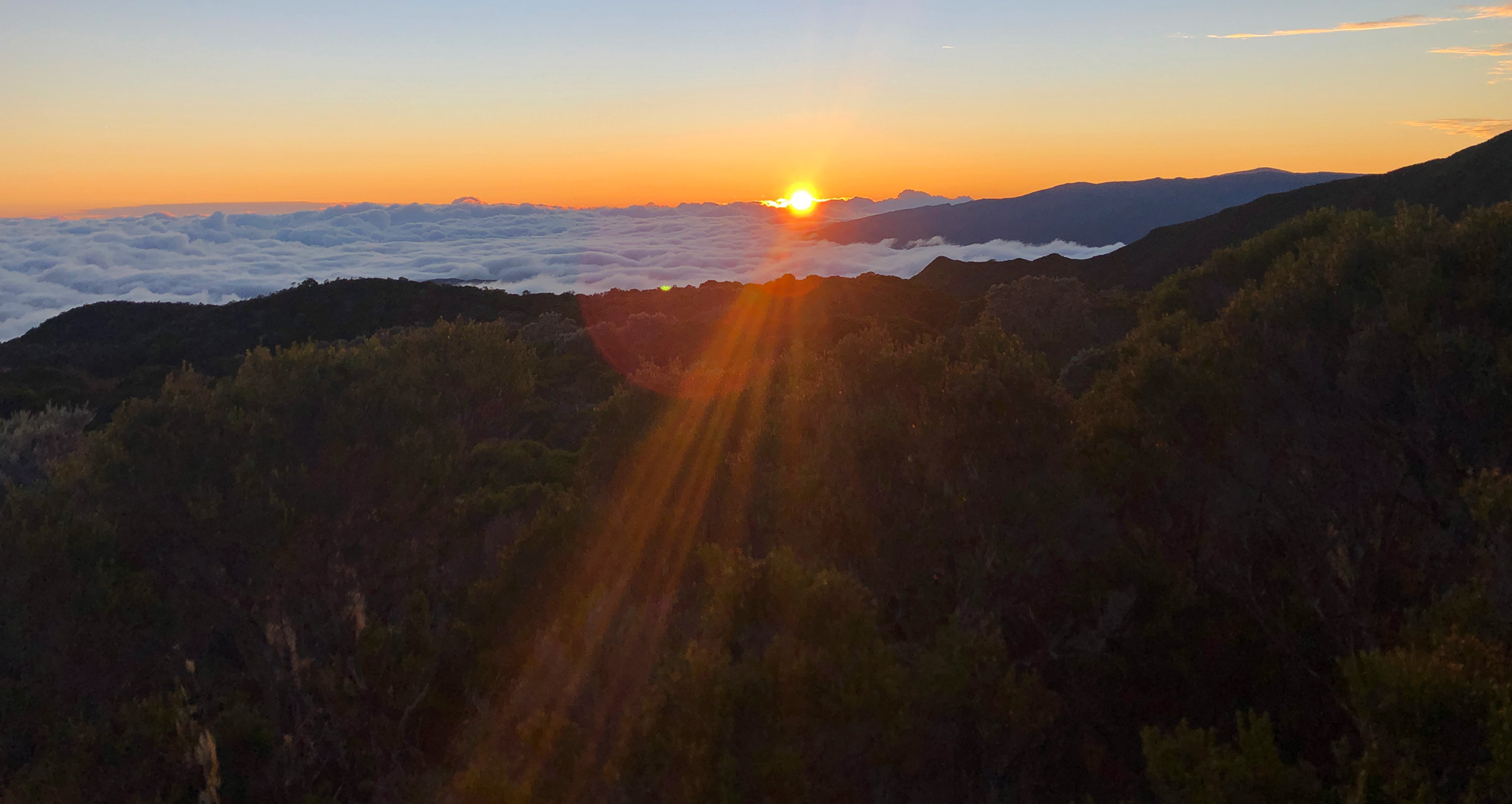
The sunrise is beautiful but I can already feel the warmth of the sun's rays on my back; I can see that it will be a long day.
The interior of the island is much greener and richer in water than I thought. From above only the shape of the volcanic formations is visible, because they are completely covered by vegetation. There is so much of it that it is almost impossible to see the paths and connections between the villages. I see what looks like the first of the two life bases (Cilaos) but I cannot understand how it is possible to get there.
In fact, whatever that is, and that I certainly can’t consider a trail, and which is only traversable thanks to the vegetation and the lianas to attach to, descends steeply to the bottom of the valley and then, mercilessly climbs up the opposite side with the same slope. On the descent, a local guy from the relay race, descending really fast, overtakes me, so without any reason I follow him and together we overtake several competitors who seem to be struggling on such technical terrain. I know it's nonsense, but it shakes me out of my night lethargy and puts me in a good mood. Note: the lianas go down a few metres with you before holding - they must be grabbed well before you need them.
Fortunately, the sixty-fifth-kilometre refreshment point is on a plateau so I don't have to climb much.
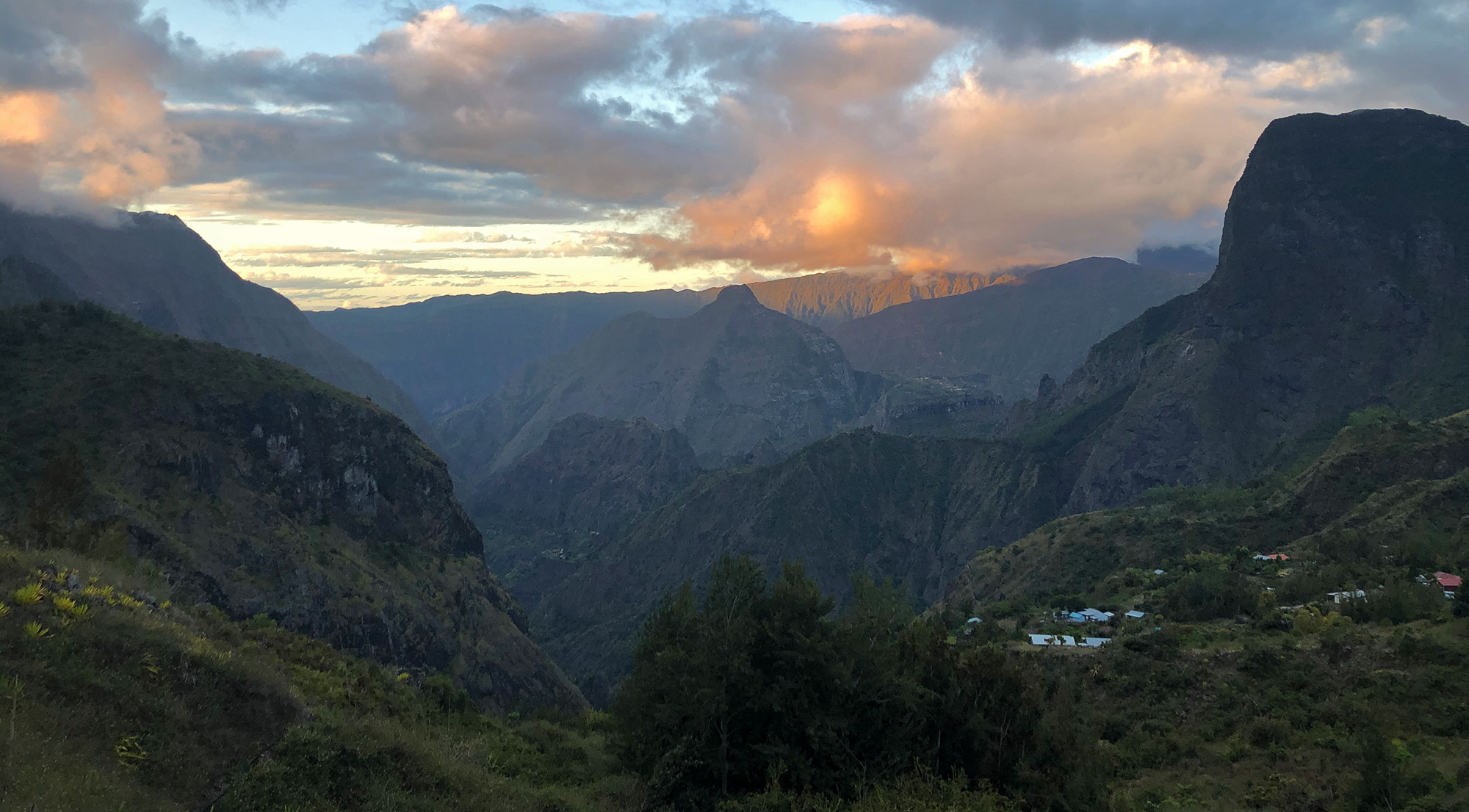
It is seven o'clock in the morning and ten hours of running have elapsed when I get there, my stomach is still feeling well. Taking advantage of the hot food, making myself a plate of rice and chicken, Creole style seems like a good idea. So far I have managed to feed myself decently by my standards: a few energy bars, a couple of gels and some broth, when available.
I also take my time because soon, at kilometre 70, one of the three toughest climbs awaits me: 1250 m of positive height gain in less than 6 kilometres, with an average gradient of 21%. From here on, it will be necessary to fill all three half-litre water bottles. I concentrate on reorganising my rucksack without making mistakes: gel, bars and new spare batteries for the headlamp because I will likely arrive at the next base camp in the dark. I replace the Mafate 3 with the lighter and more stable Evo Mafate 2, because we are approaching the Cirque du Mafate area from which the Hoka shoes take their name. I change the black Hawaiian t-shirt for the blue one. The combination of Hawaiian and Mafate seems perfect to me and this consistency, in its simplicity, puts me in good spirits. Apart from a slip in the mud, the Bryce shorts hold up well and I empty the side pockets into the recycling bins always present on the island.
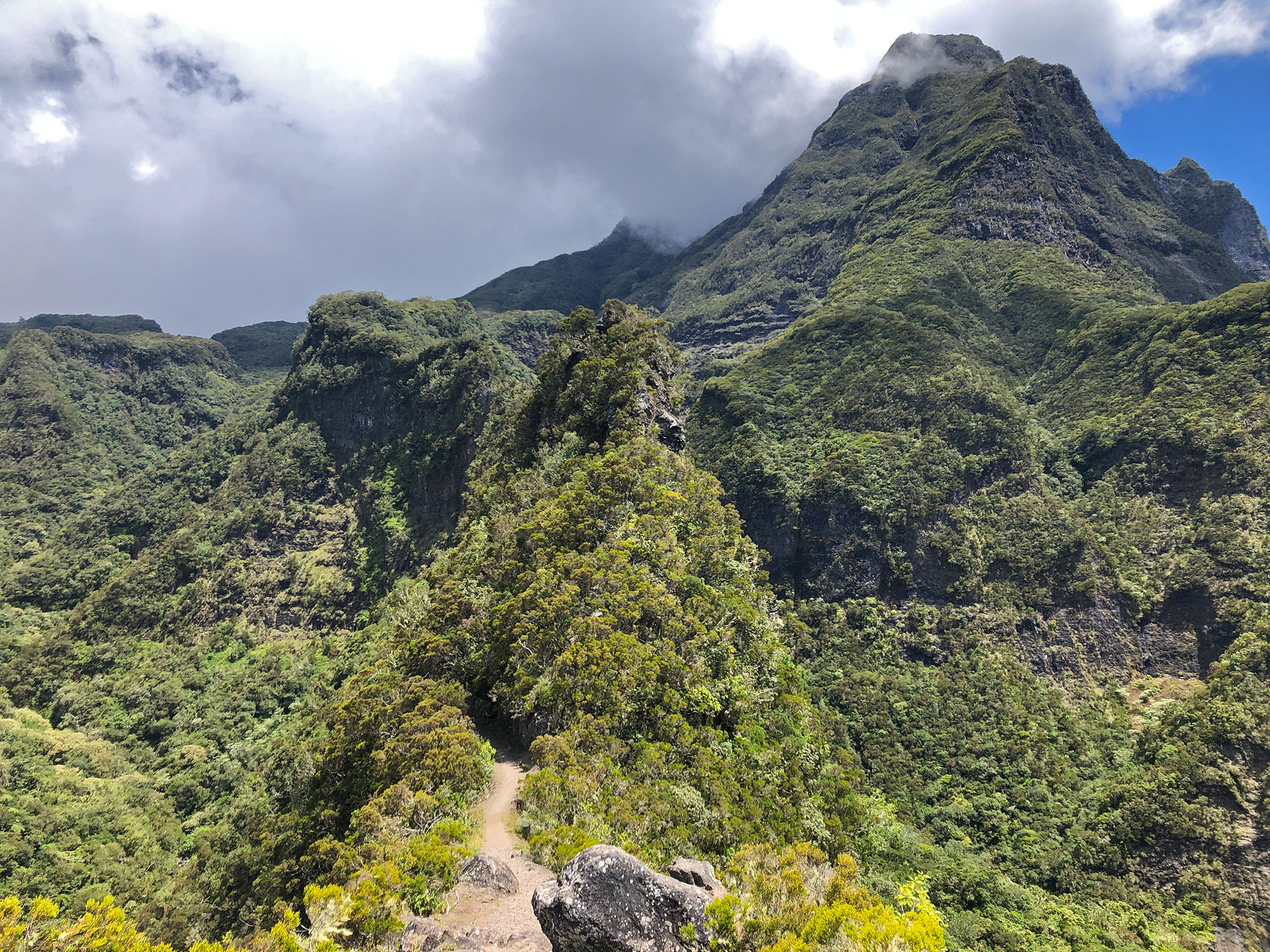
Everyone seems to have one or more assistance teams positioned near the refreshment posts; I have no one and I am happy about that, I don't want anyone to worry about me and I don't want to have any worries if I don't keep to the expected times. I am alone and that's what I need, no external factor can influence my conduct, everything depends only on me.
The much dreaded climb is indeed very demanding: when I don't need to use my hands to hold on to some rock or tree I use them above my knees (not, as many do, on the knees ;-) ) to help my quads up the hill. Despite the fact that I am climbing at an altitude of over 2,000 metres, it is very hot and I am soaking wet. I try to drink regularly, but the mix of altitude, heat and humidity is not my cup of tea. After finishing the ascent, without stopping for a breather, we dive down on the opposite side.
I would be hypocritical if I said it was enough for me to complete the race, to be a finisher. It's not enough for me: I want to arrive, to be satisfied with myself, with how I managed the race and with my ranking. This is not an easy thing, the longer and more complex the race, the harder it is. I would love to fight for a good ranking position or a good time at the finish, but races of this type cannot be improvised, so I try to stay calm – after all this is only the beginning.
Also in this part of the island, the vegetation is so dense that it seems impossible to find aid stations for such a large number of competitors, and yet, as if by magic, around a bend, right at the expected point, the aid station is there waiting for us with its load of celebration and kindness. The logistics and organisation are always up to the task and the volunteers at the refreshment stations always kind, considerate and prepared. The feeling is a bit like visiting friends who have been waiting for you for a long time and are ready to welcome you.
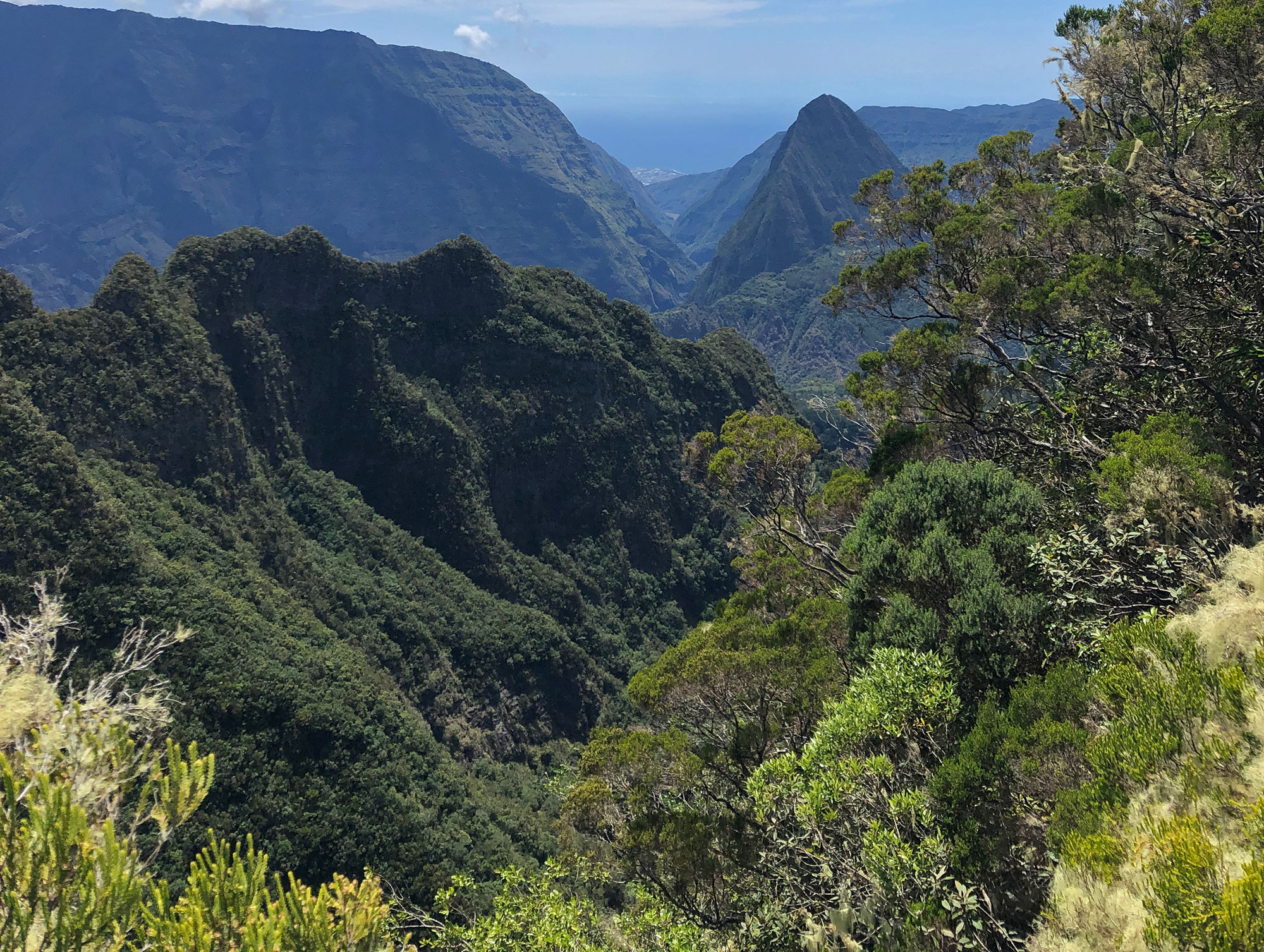
Unfortunately, I understand French well and at some point I hear that I am around the hundredth position. I would have preferred not to know and to continue going on in my blissful ignorance. Every parameter added to the equation is likely to affect the result. The fewer elements my mind has to calculate, the easier, or rather less difficult, it is not to be influenced.
Because of the intense effort I stop eating enough, the bars get stuck in my mouth without me being able to swallow them, even drinking all that water begins to prove difficult.
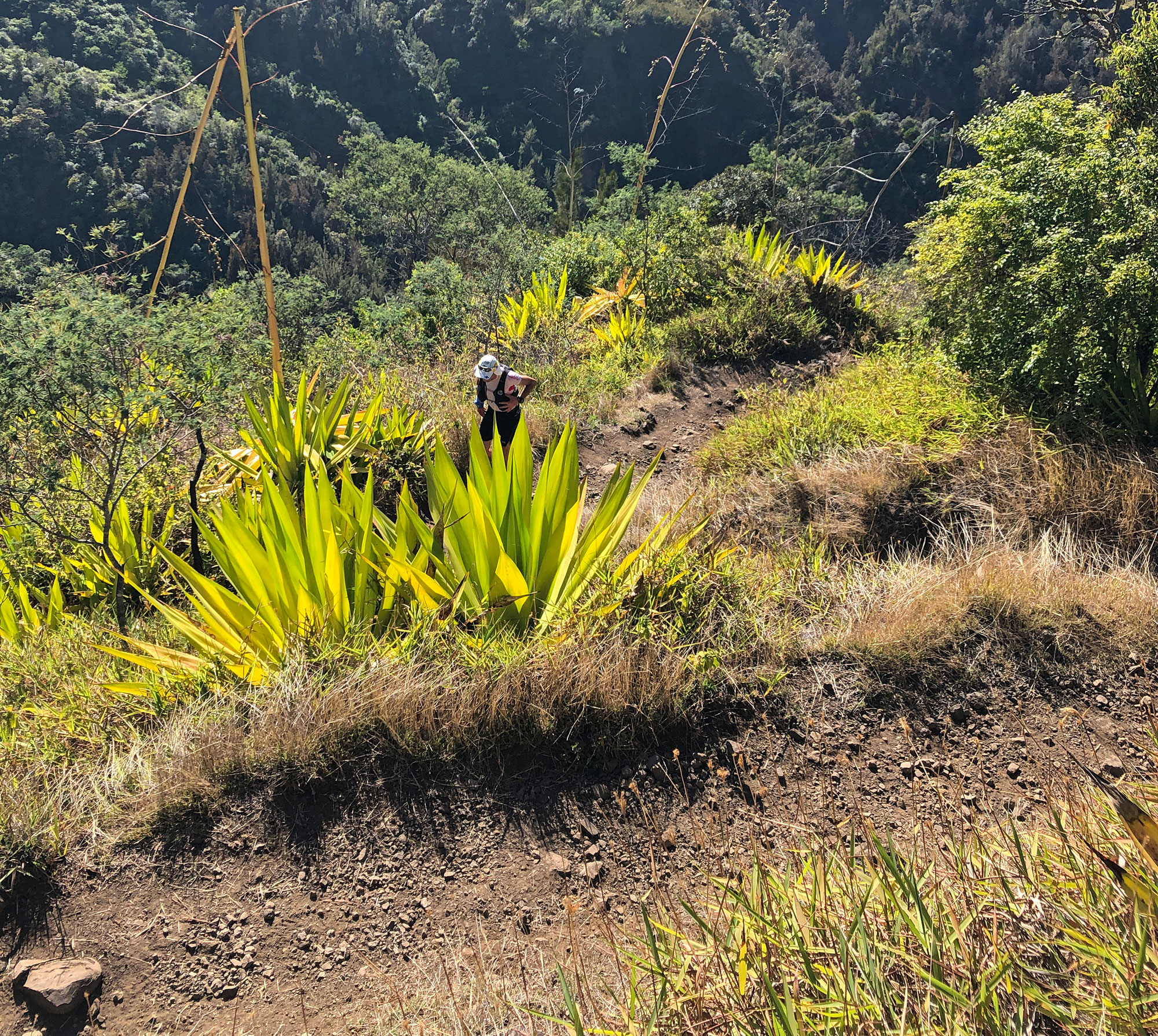
In a section that is not particularly difficult, I begin to struggle. I want to reach the aid station before evaluating the situation. I stop drinking and trying to eat, I keep my head down and concentrate only on my steps. I wish I had poles so that I could rest the apparently ever-increasing weight of my torso on my arms. With difficulty I arrive at the ninety-sixth kilometre aid station. My face must not look its best because two girls (it is an almost all-female team) from the medical staff keep asking me if I am all right. I play it down so as not to worry them (life's real problems are clearly worse) but a warning siren is sounding in my head. Standing there watching others eat makes no sense. If I need to be sick it had better be now. I get up and ask for the direction in which to continue, and after less than fifty metres my stomach turns over and tries to come out of my mouth. I am faced with the first big question: I am only a few metres from the refreshment point: do I go back or do I go forward? I think about it for two seconds and decide to carry on. I feel weak, I try to think as little as possible and not make any unnecessary calculations. I am in the middle of the storm and I let myself be carried away by the current. I stop thinking about the passing of time, as it flows inexorably, I dilate it. I no longer think in terms of hours but half-days. I change perspective, which is perhaps one of the best qualities of an Ultratrailer, even though my remaining energy is what it is and I feel as if I am moving in slow motion. I move forward.
At the next refreshment point, I stop and try to lift my legs to get some blood flowing from them to my stomach, because it's hard to make it to Saint Denis without eating.
In the meantime, the route tests my will to carry on. After a rather challenging climb I arrive at a viewpoint where a pair of hikers quietly enjoying the scenery are explaining to the runner who has just overtaken me that the next refreshment point is right there in front of his eyes as the crow flies, it must be less than two hundred metres, then I see them pointing down between their feet, I suffer from vertigo so I don't even think about it and look down almost into the void. I see the runner's expression change from 'OK this is it' to 'this can't be right'. Basically, we have no alternative but to descend for 4/500 metres into the gorge, we don't know which path, cross the river that we can't even see because the wall is practically vertical, and climb back up the opposite wall. I don't even have the strength to comment, I try to descend trying to avoid falling. It occurs to me that the first time I heard the news that a competitor had died during a race was in this one. The memory is enough to make me find the lucidity and coordination not to slip. Exhausted, at the river I jump into the water and drink from it with my mouth open. I don't know if this is the best thing to do on a tropical island, but it is beautiful. The ascent is an ordeal of 800 metres of altitude difference at 16%, luckily evening is getting closer and the competitors’ shadows are getting taller.
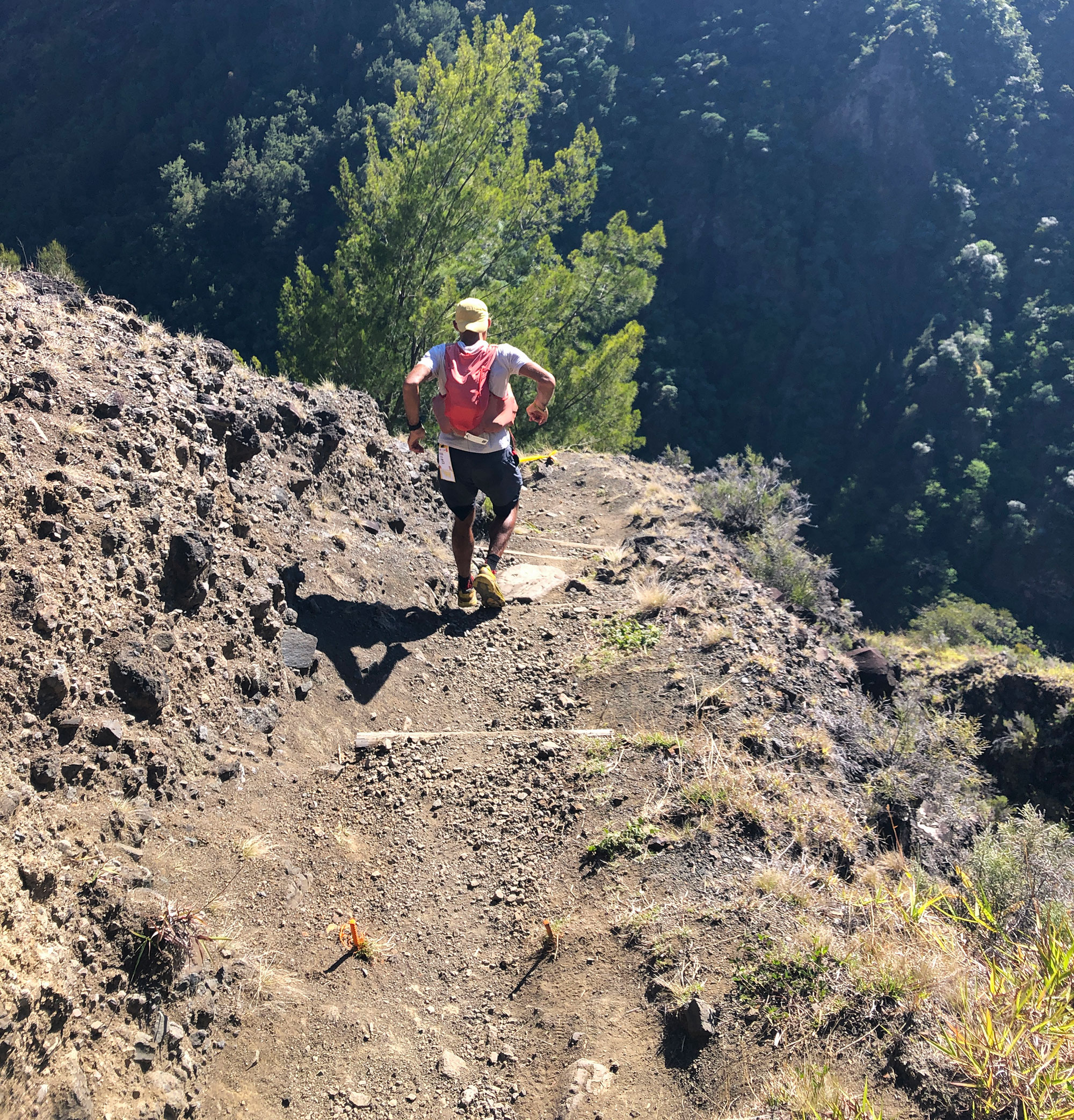
I want to get to this aid station that seemed so close. I am fed up, so, without realising it, I pick up the pace. So many have overtaken me in the last few hours, but I begin to see the most sinister thoughts appear on their faces as I overtake them again. What is it they say? Misery loves company?
It takes me more than 5 hours to cover just over 8 kilometres, I think this is my absolute worst in more than 9000 kilometres in Ultra Trail races.
I have some broth and it goes down, I add some pasta and it goes down, the change of pace and a more normal temperature have done their job. I lie down on the ground so as not to spoil the winning streak but I can't stay calm, I feel my energy returning little by little. I get up and without looking back I catch up with a small group of competitors, some from my race and others wearing the red relay bib, who are more or less on the same route but split between three teammates. In the group, as if among animals, I immediately spot the one who could be the leader of the pack and I follow him closely. On the climb, I struggle to keep up with his pace. My metabolism, short on carbohydrates, was consuming almost exclusively fats. I’d felt it, even physically, when I put my hands on my hips, to support my torso on the uphill: my hips were wearing out. Now I am asking my body to start burning off those few reserves I have managed to accumulate. It's not easy because the brain wants to use them and has no intention of leaving them to the muscles. Finally, as if the primeval instincts of our ancestors, experienced in persistence hunting had been awakened, I start competing with the pack leader and manage to disregard the brain's signals. I follow him, distance myself from the rest of the group and as soon as I sense a moment of weakness from him, I do not hesitate and pass him. The descent as always is demanding and, after a while, I no longer hear his footsteps behind me. At the refreshments I stop only to fill my flasks: I fill one with a half water/half cola mix, the other with sparkling water. This is the moment in which I decide that, despite everything, I will finish this race. I remember almost every moment like this in all the races I have entered. I run as if I have just started, or at least it feels like it. The night is beautiful, cloudless, with the moon and stars, absolute silence, broken only by the croaking of frogs. This is what I was looking for and had forgotten existed. As soon as I see a headlamp in front of me, I aim for it, reach it and pass it without making any distinction between blue or red bibs. I am in a state of complete flow, I forget my body, everything is movement - only my legs and running exist. I run across a river whose bed is made of fine black volcanic sand that gets into my shoes, but not even this can slow my northward progress.
I awaken from my idyllic state when I reach the second and last life base: my brain resumes its calculations of the remaining distance, how long it will take me and what difficulties await me.
I eat something, I force myself to take from the drop bag what I need to get to the finish. The further I go, the more I realise that I need fewer and fewer things. I leave the bars behind because there is no way I can keep them down, I take some gels, batteries for the headlamp, I change my Rockies socks which, as always, have not given me any problems, and I put on the last Hawaiian shirt, the white and blue one.
Unconsciously, I would like to set off straight away, but I know that I still have a long way to go. There are still more than 2000 metres of positive elevation gain left and soon I’ll get to the dreaded climb of the Dos d'âne with its 700 metres of elevation gain at 18%.
So many races mingle in my head with conflicting thoughts; for no particular reason I decide to get a massage, just like I’d done at the Spartathlon, as a form of respect for the toughness of the course. A bit like saying to the Race: 'I'm going to slow down, I'm going to stop, I'm going to take a break because I know that if I don't, you might win'. As I lie on the table, I realise that this isn’t what I expected, the light is too bright for my eyes, kept open for so long, while the diesel generators spoil the silence of the forest. I dip as quickly as possible into the darkness of the second night. I send a message to Irene, who will have just finished work, to let her know that I am still alive - after twenty-four hours it was only fair. She replies that I am recovering well from the one hundred and twenty-sixth position from which I had fallen and that our daughter Cecilia is following me from Milan, glued to the live race coverage.
I tackle the following climb with impetus and consequently start dripping sweat again. It's not nice, but as a seasoned Ultratrailer I also know that this is a good sign, because it means that I have hydrated properly in the meantime. The climb is brutal and there is also little to hold on to; every now and then a few lianas, in the most exposed spots a few chains, for the rest I climb as best I can. Over two hours go by to cover less than four kilometres. Fortunately, the descent is not the hardest, I can see the sea and the coast in the distance, I just hope that the route does not hold any more surprises for us. It is easier to face a difficulty if it is expected, it is much more difficult if it is unexpected.
I keep rising in the rankings, at the sides of the path I often meet competitors who are asleep, someone progresses with difficulty.
The Chemin des Anglais tests my endurance: it is not a particularly difficult section, it is a paved path with lava rocks irregularly arranged. One should run this section because it is never steep, but given the irregularity of the steps, it is very difficult to keep running, a real nightmare that never seems to end. The black stone has absorbed the sun's heat throughout the day and happily releases it during the night, I can feel that the Vibram outsoles of my shoes are suffering.
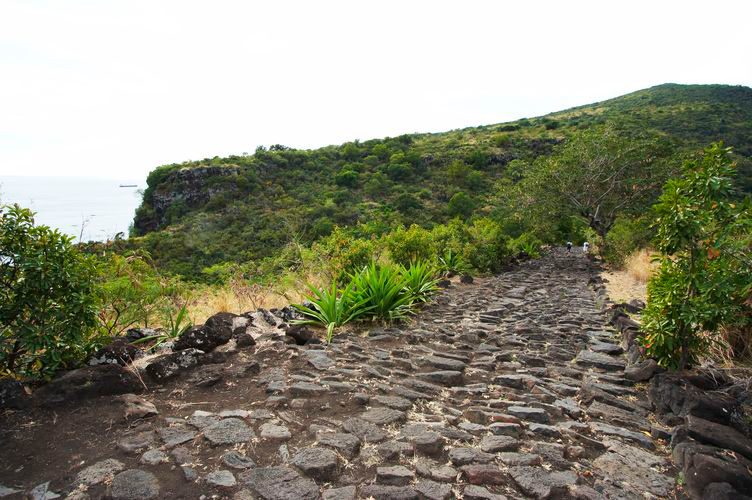
(daytime stock photo, just to give you an idea)
I finally get to La Possession, we are at the beach, but they only serve tea and boiling broth, my silicone cup is about to give out too; I impatiently wait for them to cool down.
To my great joy the paved path continues past the village. I can't take it anymore, for never-ending kilometres I am alone, and if it weren't for a few isolated competitors to overtake I would stop and sleep somewhere.
I am almost glad when the hard climb starts again so I don't have to try and run.
After the penultimate aid station I set off again with two other competitors and one of them is much faster than me on the uphill; I cannot keep up with him but I make up my mind not to lose sight of him, as soon as the trail flattens out a little I try to catch up with him. I know it's absurd to start racing at this point but it's a great pastime. Our little convoy continues to pass other competitors who no longer offer any resistance, they just want to finish the race, no matter when.
I am still on his tail when at a certain point, in the middle of a climb, he says that he is tired and that he is going to stop. Out of the corner of my eye I see him sit on the red earth, as I overtake him. I carefully dose the two remaining gels, but by now nothing can stand between me and the finish, it is only a matter of time.
On the last climb I push hard and my body responds perfectly, at the last aid station I don't even stop. I run like a child in a playground, it's pure joy.
I no longer remember that in an ultra, the race is so long that you can die and rise again before it ends. It seems absurd to be able to run relatively hard, when a few hours earlier one was struggling even to walk. By the end I will have passed more than fifty runners.
The last descent is absurd. I can't even see where to put my feet, but I don't care, I go down without brakes, jumping over rocks and running like a madman and enter the Stade de la Redoute in St. Denis more than 33 hours after the race start on the other side of Reunion Island.
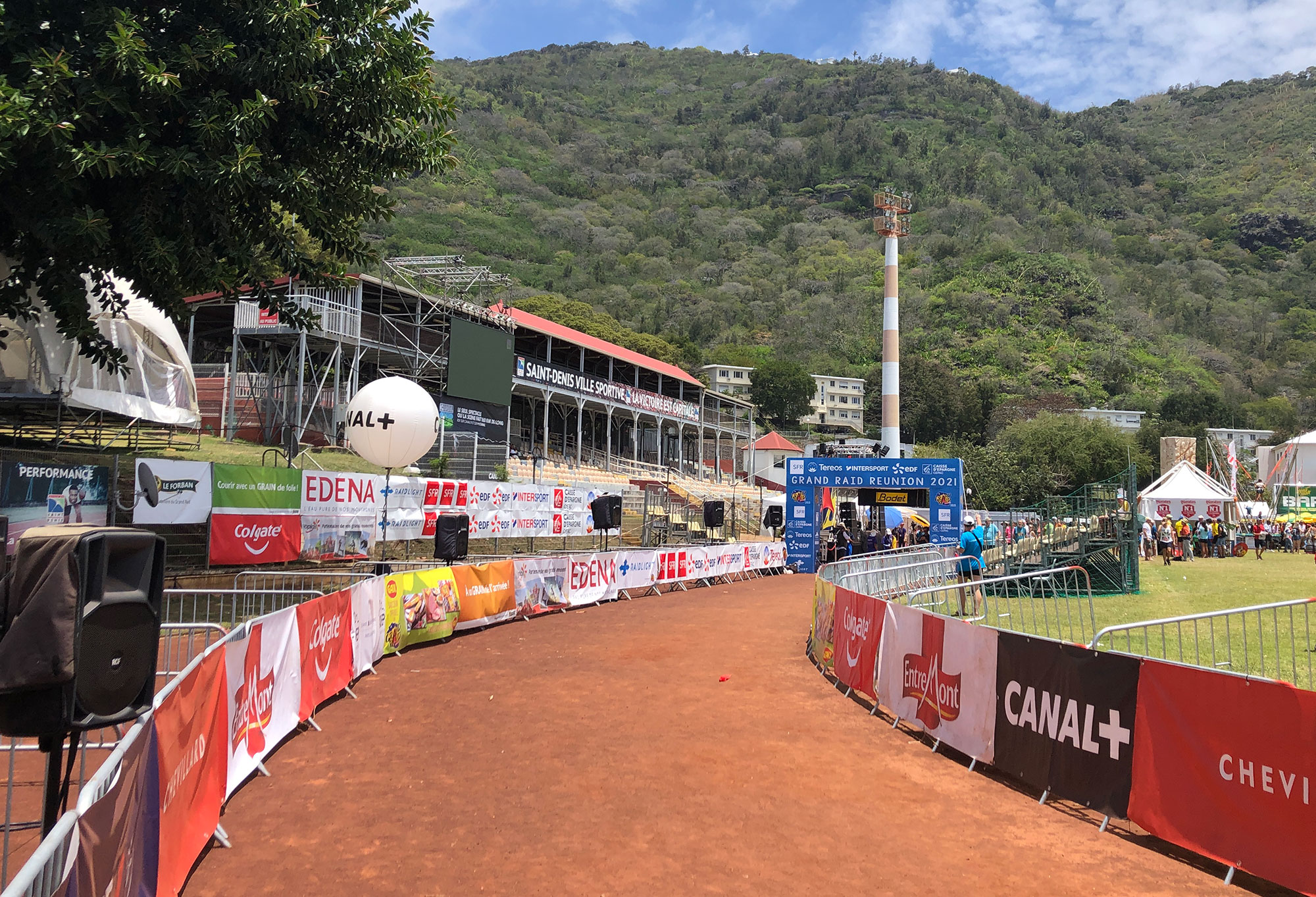
The Diagonale was for years considered the toughest race in the world; later other races would vie for this title, races that are probably more challenging, such as the TOR, PTL or Euforia. I have been lucky enough to finish a few of them, but this one is definitely in the Top 10 for its toughness.
I don't know if I would do it again but I'm glad I did.
For the number crunchers: Strava
I used a COROS Vertix. I was curious to try it out, I started with 99% battery and, after 33 and a half hours non-stop with maximum GPS accuracy, I arrived with exactly 50% battery. Normally GPS watches run out of battery after 20/25 hours, while the Vertix can easily get to 65.
